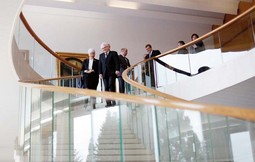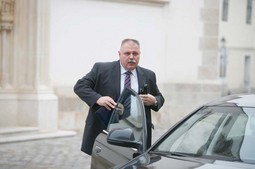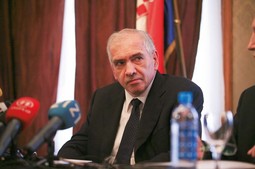Published in Nacional number 745, 2010-02-23
Premier opens war against Ivo Josipovic
The peace between the new president and premier lasted a whole of twelve hours, coming to a breakdown over Josipovic's economic team
 SHORT LIVED IDEAL Premier Jadranka Kosor has perceived Josipovic's strong economic team as an attempt to create a parallel system of power, and she fears that emphasizing the poor economic situation will blemish the reputation she's earned in her battle against corruption
As soon as Ivo Josipovic announced the members of his Economic Council, the Government opened war against the newly elected Croatian president. The Government is convinced that Josipovic is attempting to create a parallel centre of political decision-making, and to join the opposition in criticising the work of Jadranka Kosor and her colleagues. During the summer or fall at the latest, they believe he will publically support a call for the resignation of the government, and call early parliamentary elections. And so the peace pact between Jadranka Kosor and Ivo Josipovic lasted less than twelve hours. While all seemed ideal on Friday morning during the first official meeting of the premier and the president, the first informal criticisms of Josipovic and his economic team came from the government that evening.
SHORT LIVED IDEAL Premier Jadranka Kosor has perceived Josipovic's strong economic team as an attempt to create a parallel system of power, and she fears that emphasizing the poor economic situation will blemish the reputation she's earned in her battle against corruption
As soon as Ivo Josipovic announced the members of his Economic Council, the Government opened war against the newly elected Croatian president. The Government is convinced that Josipovic is attempting to create a parallel centre of political decision-making, and to join the opposition in criticising the work of Jadranka Kosor and her colleagues. During the summer or fall at the latest, they believe he will publically support a call for the resignation of the government, and call early parliamentary elections. And so the peace pact between Jadranka Kosor and Ivo Josipovic lasted less than twelve hours. While all seemed ideal on Friday morning during the first official meeting of the premier and the president, the first informal criticisms of Josipovic and his economic team came from the government that evening.
Kosor and her cabinet believe that Josipovic will launch an attack on the government over the next few months and will stand, at least indirectly, on the side of the opposition. The government views the group of businessmen invited to join his team as an attempt to form a parallel government, which will soon begin to fiercely attack Kosor's economic policies. Their predictions were already confirmed on Monday, when Damir Kustrak gave an interview for Business.hr, stating that the HDZ government does not have the necessary capacities to carry out reforms and cuts in the public sector, and that if the anti-recession measures fail, early elections should be called. In other words, Kustrak confirmed the government's fears: that the Office of the President is not satisfied with the current economic policies.
A high ranking source in the Office of the President confirmed for Nacional on Sunday that Josipovic wants to avoid a conflict with the government, but that he will form his position based on the conclusions of his economic experts. That means that the President fully supports the criticisms of the government made by Damir Kustrak and Ivica Mudrinic, and will have no qualms about making such opinions public.
“The government has no right to complain over the members of the Economic Council, as the president expressed his dissatisfaction with the country's economic policies months ago, and stated that he would put together a team of our leading entrepreneurs. They are upset because these are the leading experts in the field in Croatia, and their opinions are respected. If they are complaining that his advisors are their critics, what would they have said if we included the union leaders in the council?” commented Nacional's source. This official stressed that Josipovic's first issues of focus will be oriented at foreign policy and the intelligence community, and then later on the economy. But once this becomes the focus, he will surely criticise the lack of ideas for economic growth, retaining the crisis tax and the rise of unemployment. Though the Constitution does not allow him to have a direct influence on economic policy, Josipovic's warnings could harm the HDZ.
At this time, there are three centres of discontent surrounding Josipovic's first moves. The first is Premier Kosor. When she opened the anti-corruption scandals over the winter, Kosor established herself as the highest rated politicians, and enjoyed far wider support than her government and the HDZ. Her dedicated work completely cast Ivo Sanader out of politics, and her success in unblocking the EU negotiations confirmed her choice as a competent premier. But Kosor is between a rock and a hard place on economic matters, and the government's anti-recession measures have failed to get the economy moving and to stop unemployment from rising. There are currently almost 310,000 people registered with the unemployment bureau, and there could be more than 350,000 by summer. But the opposition is also lacking any solutions, and so the SDP have announced that they will not call for early elections until the fall.
Under such circumstances, the team of entrepreneurs and economic experts gathered together by President Josipovic has become a great threat to the premier. These are successful businessmen, whose businesses are not reliant on state aid, which affords them the right to criticise. Kustrak has already done so, Mudrinic attacked the government's economic policy a year ago, while Emil Tedeschi is in the midst of a conflict with Josip Friscic over the privatisation of Podravka. Kosor was quick to realise that this group of experts could spell trouble for her, and so she reacted on Saturday, just one day after the names of Josipovic's Economic Council were made public. Speaking at the 20th anniversary celebration of the HDZ in Karlovac, Kosor warned that the “government runs the economic policy, we have an Economy Ministry and a parallel ministry is not an option”. She also stated that she has the impression that the majority of people in the president's team are critics of the government, but that “personally, I don't have a problem with that and the government is open to cooperation with all sides, even such an advisory team, made up of people representing specific companies”.
 FINANCE MINISTER Ivan Suker does not take well to criticism from expert circles that his fiscal policies are poor
Ivan Suker is the second government official to feel threatened by Josipovic's advisors. Suker is the main advocate of the current government policy, and creator of the tax system. On the other hand, Josipovic's advisors are proposing measures that are diametrically opposed: cutting taxes, cutting the crisis tax and reducing the public administration, and we can soon expect the president to speak out on this matter, meaning that he will publically go up against the HDZ policies. Quick to react was Andrija Hebrang, who publically warned Josipovic to stay out of operative politics. Hebrang had several conflicts with Stipe Mesic in the past, and it looks like he plans to continue this with the new president.
FINANCE MINISTER Ivan Suker does not take well to criticism from expert circles that his fiscal policies are poor
Ivan Suker is the second government official to feel threatened by Josipovic's advisors. Suker is the main advocate of the current government policy, and creator of the tax system. On the other hand, Josipovic's advisors are proposing measures that are diametrically opposed: cutting taxes, cutting the crisis tax and reducing the public administration, and we can soon expect the president to speak out on this matter, meaning that he will publically go up against the HDZ policies. Quick to react was Andrija Hebrang, who publically warned Josipovic to stay out of operative politics. Hebrang had several conflicts with Stipe Mesic in the past, and it looks like he plans to continue this with the new president.
There are at least two more areas in which the government believes that future conflicts with the president will arise: in foreign policy and in control over the intelligence community. Ivo Josipovic intends to run an autonomous foreign policy, as seen by the appointment of Josko Paro as an advisor. Paro is among the best known Croatian diplomats, having served as ambassador in Great Britain and Holland, and he worked on formulating Croatia's foreign policy towards the countries of SE Europe in Ivica Racan's government. In comparing their diplomatic careers, Paro has a much stronger rating that Foreign Minister Gordan Jandrokovic.
In comparison with Mesic, Josipovic does not intend to often consult with the government on the appointment of ambassadors and he plans to significantly reduce the current orientation towards third world countries, instead focusing much more attention on the European Union, the United States and neighbouring countries, Serbia and BiH. It could be expected that the new foreign policy doctrines advocated by President Josipovic, together with potential conflicts over the appointment of diplomatic staff, will also be a source of conflict with the government. Furthermore, President Josipovic wants to actively partake in the work of the Croatian intelligence community. He has personal motive for this, making it known that he was subjected to attacks by the intelligence community during his campaign. The Office of the President believes that the media have warped the role of Sasa Perkovic, who organised the inquiry into who was behind the false accusations made against the presidential candidates. Josipovic assessed that Perkovic handled the task fairly and professionally, and thus decided to keep him on as an advisor.
Considering that the conflict with Josipovic has arisen in the meantime, Kosor and Hebrang have expressed their suspicions via the press that not all was above the law in this scandal. They wanted to suggest that the advisor might have overstepped legal bounds, and that Josipovic was unprofessional in his selection of advisors. Now, Josipovic will surely not turn his back on Perkovic, as that would give his opponents the right to claim that the new president has made another mistake. In the coming months, he will intensively supervise the working of the intelligence community, and these kinds of announcements are not very welcome in the government.
But the foundation of the conflict between Kosor and Josipovic remains the issue of economic policy. The government feels that Josipovic will err if he listens to Mudrinic and Kustrak. The main argument of Kosor's team is that regardless of who is in power, they will not be able to guarantee a quick way out of the crisis. For the executive government, stories about a quick start to production is simply demagogy, and it also sounds as though they were written by the opposition parties. Even though Josipovic's staff claimed during the campaign that he would keep equally distant between the government and the opposition, the ruling coalition no longer believes that is true.
 GOVERNOR ROHATINSKI is expecting the government to respond adequately to the CNB's reduction of mandatory bank reserves
Jadranka Kosor and Ivan Suker, and the leadership of the main coalition partner HSS, are still not ready to make the drastic cuts proposed by Josipovic's economic advisors, and by independent experts and many in the opposition. The government knows that cutting tens of thousands of surplus jobs in state and public enterprises would cause social rebellion, and likely the fall of HDZ from power. Furthermore, a source close to Kosor confirmed for Nacional on Monday that the government projections indicate that state finances should be on safe ground until early next year.
GOVERNOR ROHATINSKI is expecting the government to respond adequately to the CNB's reduction of mandatory bank reserves
Jadranka Kosor and Ivan Suker, and the leadership of the main coalition partner HSS, are still not ready to make the drastic cuts proposed by Josipovic's economic advisors, and by independent experts and many in the opposition. The government knows that cutting tens of thousands of surplus jobs in state and public enterprises would cause social rebellion, and likely the fall of HDZ from power. Furthermore, a source close to Kosor confirmed for Nacional on Monday that the government projections indicate that state finances should be on safe ground until early next year.
Ivan Suker is convinced that he will find the money necessary for shipbuilding and social costs, and so he is not considering any major reforms now. Based on these projections, the government wants to focus on completing the negotiations with the European Union, which could be at the end of this year or in February 2011 at the latest. Jadranka Kosor is counting on a successful end of the negotiations to bring the ruling coalition new popularity, and to reduce the negative impacts of the poor situation in the economy.
The only problem is that this is something that might take place over the next twelve months, and until then, the government will have to face countless critics. After the retreat of the exceptionally passive opposition, President Ivo Josipovic has surfaced as the main opponent of the HDZ and Jadranka Kosor. When he finally presents his own economic strategy, compiled together with the experts who are against the government's economic policy, the conflict between President Josipovic and Premier Kosor could escalate.
Related articles
Barisic could bankrupt HDZ
Chief State Attorney Mladen Bajic could strike a massive blow against the ruling HDZ party with a single signature, and put the party into… Više
Latest news
-
28.10.2010. / 14:15
'A profitable INA is in everyone's interest'
-
28.10.2010. / 09:38
Sanader’s eight fear SDP — Won’t bring down Government
-
21.10.2010. / 15:02
Interior Ministry turned a blind eye on Pukanic assassination
-
20.10.2010. / 09:34
Barisic could bankrupt HDZ




